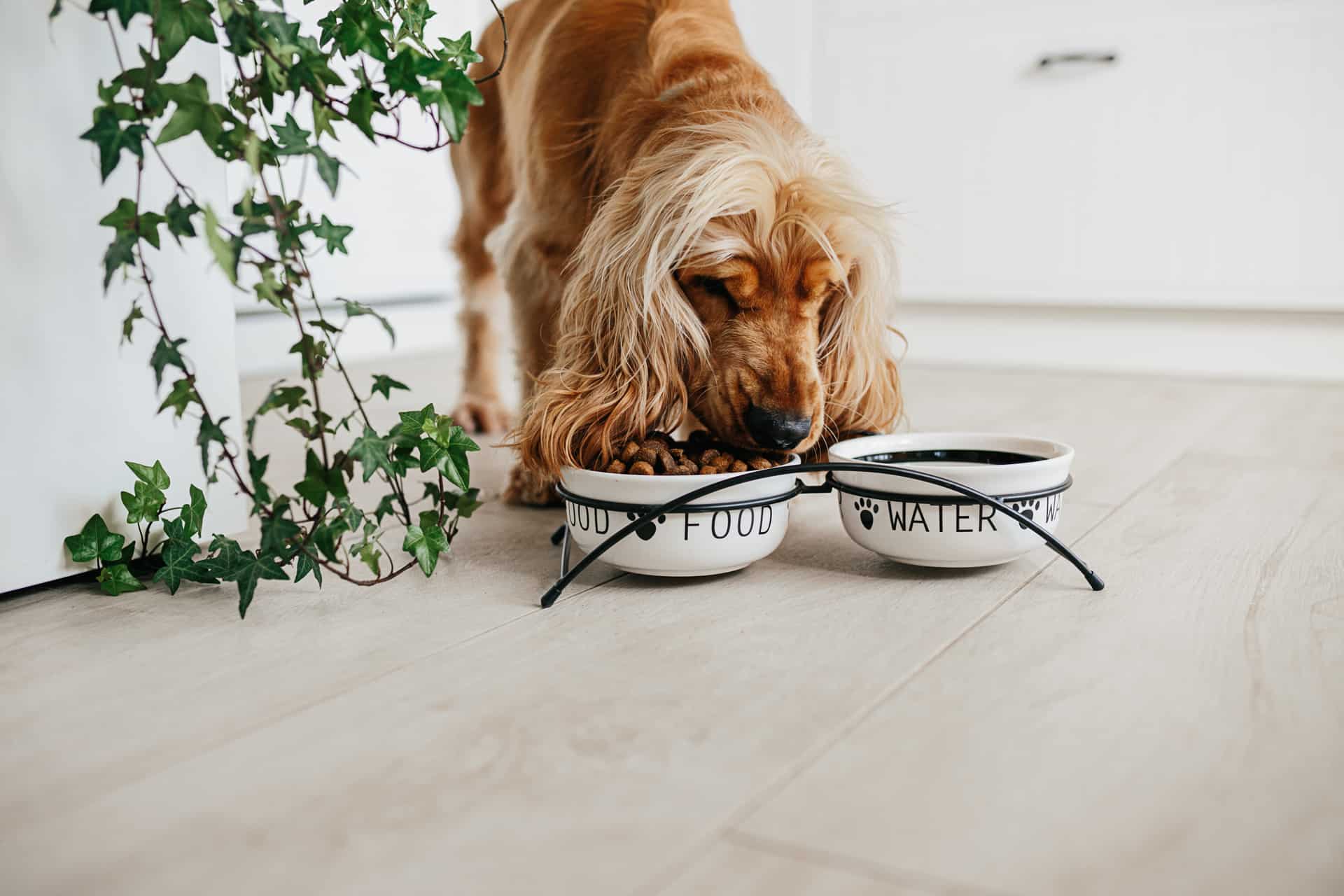Essential Nutrients for a Healthy, Happy Dog
A balanced diet is essential to keep your pup healthy, happy, and energetic. Necessary nutrients for them to thrive include:
- Protein – Dogs need protein to build and repair tissues. Animal sources like chicken, beef, or fish are best.
- Carbohydrates – Carbs give energy and fibre, which helps digestion. Good options include rice, oats, or sweet potato.
- Fatty Acids – Fatty acids help maintain healthy skin and coat. Omega-3 and Omega-6 come from fish oil, flaxseed oil, and chicken fat.
- Vitamins and Minerals – Needed for numerous body functions. Look for food with Vitamins A, B, C, E, and K, plus calcium, iron, and potassium.
- Water – Essential for temperature control, nutrients and waste transportation, and hydration. Make sure your pup has fresh water always.
The Importance of Essential Nutrients in Your Dog’s Diet
Nutrition is essential for your pup’s health and happiness. Essential nutrients in a balanced diet help your pup stay active, have a shiny coat, strong immune system and live longer. Let’s look at the importance of essential nutrients for your pup’s diet and how to ensure they get enough.
Understanding the role of essential nutrients in a dog’s body
Essential nutrients are key for a dog’s overall health and wellbeing. They are important for many body processes, such as growth, development, and energy production. A balanced diet, including the following, is essential:
- Protein: Necessary for building and repairing tissues, muscles, and organs.
- Carbohydrates: The main source of energy for a dog. Plus, aids in digestion and nutrient absorption.
- Fats: Keeps a dog’s skin and coat healthy, and supplies their body with energy.
- Vitamins and minerals: Supports the immune system, bone health, and overall health.
Your pup needs all these essential nutrients for a healthy and happy life. Plus, don’t forget regular exercise and vet check-ups.
The consequences of nutrient deficiencies in dogs
Nutrient deficiencies can be serious for dogs. It’s important to give them a diet with all their nutrition needs.
Common deficiencies:
- Protein- slow growth, muscle wasting, weak immunity.
- Fat- flaky skin, poor coat, low vitality.
- Omega-3 fatty acids- joint pain, heart disease, bad brain function.
- Vitamins and minerals- poor eyes/skin, anemia, bone deformities.
Pro tip: Talk to your vet to make sure your pup’s diet is balanced.
Identifying your dog’s individual nutrient requirements
Humans and dogs have one thing in common: they both need essential nutrients to stay healthy. Knowing your pup’s specific needs is key to selecting the right food. Here are some must-haves:
- Protein: Necessary for strong muscles and tissues.
- Fats: These provide energy and help with skin and coat health.
- Carbohydrates: Gives energy plus dietary fiber for a healthy digestive system.
- Vitamins and Minerals: Essential for strong bones and teeth, healthy skin and coat, and a strong immune system.
Young pups, senior dogs, and those with special needs have different nutrient needs. Speak to your vet to decide the best diet and nutrients for your dog.
Essential Nutrients for Your Dog’s Health
Proper nutrition? Must have it for your pup’s health and joy! It is very important to give them proper nutrition to stay in good shape, both mentally and physically. Each pup has different nutritional needs. But, all pups require certain essential nutrients to be in tip-top shape.
Let’s talk about those essential nutrients for your pup’s diet!
Proteins: Source, amount and importance in a dog’s diet
Protein is a must for dogs. It repairs and maintains their tissues and muscles. It also gives essential amino acids that their bodies can’t make.
Sources of protein are meat, fish, dairy, and poultry. The amount needed depends on the age, size, breed, and activity level.
Adults, pregnant and nursing dogs, and active breeds need more protein compared to puppies and seniors.
A high-protein diet helps with weight control, growth, skin, teeth, and fur. Make sure your dog has good quality protein that meets their needs. Ask a vet how much and what type is best for your dog’s health and lifestyle.
Fats: the right type, amount and importance in a dog’s diet
Fats are super important for your pup’s health and happiness. They have lots of benefits, like:
- Energy: 2x more energy than proteins and carbs!
- Skin and coat health: Keeps skin and fur looking great.
- Nutrient absorption: Vitamins A, D, E, and K need fat for absorption.
- Cell function: Essential for cell growth and healthy organs.
Talk to your vet about the right amount and kind of fats for your dog’s diet.
Carbohydrates: type and amount in a dog’s diet
Carbohydrates are important for dogs. They give energy and help digestion. Different breeds, ages, weights, and activity levels need different carbs.
Common types include whole grains like brown rice, oatmeal, and barley. These are high in fiber which helps digestion.
Vegetables and fruits like sweet potato, carrots, peas, and green beans are full of vitamins and minerals.
Legumes like chickpeas and lentils contain protein, iron, and fiber, too.
How much carbs your pup needs depends on them. It can range from 30% to 70%.
Talk to a vet or pet nutritionist to find out what works best for your pup.
Vitamins: Water-soluble and fat-soluble vitamins and their importance to dog health
Vitamins are essential for keeping dogs healthy and preventing diseases – just like humans. They are split into two types: water-soluble and fat-soluble.
Water-soluble vitamins include Vitamin C and B-complex vitamins. They dissolve in water and are quickly absorbed into the body. They help to make energy, fight disease, and form red blood cells. Since they’re not stored, your pup needs them with a balanced diet.
Fat-soluble vitamins are A, D, E, and K. They’re stored in fat tissue and the liver and need fat to be absorbed. They help keep eyesight, bones, skin, and blood clotting healthy, immune system working, plus antioxidant activity. Too much of these vitamins can be toxic, so follow the suggested dosage based on the dog’s age, breed, and weight.
Minerals: Essential minerals for a dog’s body and their sources
Dogs need minerals for their health and to prevent issues. Below are some essential minerals and what they come from:
- Calcium – perfect for strong bones, teeth, and muscles. Sources: dairy products, leafy greens, and bone meal.
- Iron – this is key for proper blood circulation and oxygenation. Sources: meat, liver, and leafy greens.
- Zinc – this helps with the immune system and skin health. Sources: meat, eggs, and seafood.
- Potassium – needed for nerve function and muscle contraction. Sources: bananas, potatoes, and beans.
- Sodium – helpful for a good fluid balance. Sources: table salt and processed food.
Remember, chat to your vet to check if your dog’s diet has the right nutrients.
Understanding Dog Food Labels and Ingredients
Selecting the ideal food for your pup is key to their overall health. Knowing what is in the food, and how distinct ingredients and nutrients can help them, is a great way to make sure your pup is receiving all the nutrition they require. In this article, we’ll observe the various components and nutrients found in dog food labels, plus their value for your four-legged friend.
How to read and analyze dog food labels
It’s essential to read and analyse dog food labels to guarantee your pup gets the right nutrition. Here’s how:
- Find the AAFCO Statement; this certifies the food meets the nutritional standards set by the Association of American Feed Control Officials.
- Glance at the Ingredients List; the first few ingredients are the most important. Look for top-notch protein sources first.
- Recognise Essential Nutrients; these include protein, fat, carbohydrates, vitamins, and minerals. Ensure the food offers the right balance for your pup’s age, breed, and activity level.
- Stay away from Unhealthy Ingredients; avoid dog food with artificial preservatives, colours, flavours, by-products, and filler.
By understanding dog food labels, you can pick the best food for your pup’s wellbeing and joy.
Pro Tip: Talk to your vet to get the best nutritional plan for your pup.
Common ingredients in dog food you should be aware of
As a pet owner, it’s wise to know the ingredients in dog food. Here’s what to look for when you read labels:
- Meat by-products – leftovers like organs, bones, and cartilage. Not dangerous, but not as nutritious as whole meat.
- Corn and wheat – fillers to provide carbs. Little value nutritionally, and some dogs may be allergic.
- Artificial preservatives – such as BHA, BHT, and ethoxyquin. Generally safe, but may be risky for some dogs.
- Animal fat – can come from any animal. Used for fat and flavor. Quality is hard to determine.
By learning about ingredients, you can make better choices for your pup’s health and happiness.
Identifying harmful ingredients in dog food
It’s important to know which ingredients to avoid when buying dog food. These include:
- By-products – organs, bones, beaks, etc. They are low in nutrients and can contain bad stuff.
- Artificial preservatives – BHA, BHT and ethoxyquin, which can be cancer-causing.
- Artificial flavors and colors – these can cause allergies and skin irritations.
- Grains – hard for dogs to digest, can lead to allergies and digestive issues.
Instead, choose foods with high-quality protein sources like meat, fish or poultry. Plus, essential vitamins, minerals and nutrients.
Pro Tip: Talk to a vet about your pet’s specific nutritional needs. Consider age, breed, health and activity level.
Feeding Your Dog a Balanced Diet
Feeding your pup the right nutrients is key to their long-term wellness. A balanced diet should include proteins, carbs, fats, vitamins, minerals, and water. These nutrients must be provided in the right amounts for optimal health. Let’s chat about the essential nutrients your pup needs daily and how to guarantee they are getting the correct nutrition.
Planning a balanced diet for your dog
For your pup’s well-being, it is essential to devise a nutritionally balanced diet. Five key nutrients are essential: protein, fat, carbohydrates, vitamins, and minerals.
Protein: Chicken, beef, and fish are excellent sources of simple-to-digest protein.
Fats: Fats are important for energy and keeping the coat and skin healthy.
Carbohydrates: Brown rice, sweet potatoes, and barley are good sources of carbs.
Vitamins: Make sure your pup’s diet includes A, C, D, E, and K vitamins.
Minerals: Calcium, magnesium, sodium, and potassium are must-haves.
Tip: Speak to your vet before making any changes to ensure the diet is suitable for your pup’s needs.
Understanding how to feed your dog safely and healthily
It’s critical to know how to feed your pup safely and healthily. A balanced diet for them includes essential nutrients in the right amount for optimal health and energy. Here are the basics:
Protein: Meat, fish, eggs, and lentils all provide protein for muscle growth and repair.
Carbohydrates: Oats, sweet potatoes and barley generate energy and aid digestion.
Vitamins & Minerals: Leafy greens, carrots and berries support the immune system, eyesight and more.
Fats: Fish oil, coconut oil and flaxseed are essential for energy production, nutrient absorption and a healthy coat.
Feed your dog these vital nutrients and they’ll be healthy, happy and full of energy!
Overcoming feeding droughts and allergies
For pet owners, feeding droughts and allergies can be quite a struggle when looking to give their pooch a good, balanced diet. Here are some tips that could help you out:
For feeding droughts:
- High-grade wet food can be added to their diet, to increase their hydration and nutrient intake.
- Fruits and veg make for a tasty, low-calorie snack.
- Oils like fish oil or coconut oil can be mixed in for extra nutrition and flavor.
For allergies:
- Check with your vet to pinpoint the allergen and create a custom meal plan for your pup.
- Stay away from common allergens such as wheat, soy, and corn. Look into hypoallergenic food instead.
- Raw food or a limited ingredient diet is a good option too, as it simplifies their diet and reduces the chance of allergic reactions.
Remember, always ask your vet before making any dietary changes, especially when managing allergies and droughts!
Special Considerations for Puppies and Senior Dogs
Puppies and senior dogs have different dietary needs than adult dogs. Puppies need more nutrients and the type and amount may alter as they grow. Elderly pooches may need extra nutrients, like Omega-3 Fatty Acids, to combat aging.
Let’s look at their specific dietary needs.
Nutrient needs for puppies at different stages of growth
Puppies need different nutrients, essential for their health and a happy adulthood. Let’s break it down by growth stages:
- Six to eight weeks: Mama’s milk has all they need.
- Four to six months: Time for a high-protein, fat, and calorie diet.
- Six months to one year: Now, switch to a balanced ratio of protein, fat, and carbohydrates.
As a pet-owner, give your pup the right nutrients. Ask your vet for the best diet for them.
Essential nutrients that senior dogs may be lacking
As your senior pup gets older, they may require special dietary needs to stay healthy and happy. Here are some essential vitamins they may be lacking:
- Protein – Senior dogs need higher protein in their diet as they age. Animal proteins like chicken, beef and fish are easier to digest.
- Fiber – High-fiber foods help with bowel regularity and prevent constipation, which is common in older dogs. Canned pumpkin or green beans help improve digestion.
- Glucosamine & Chondroitin – These supplements aid with joint health and help reduce the inflammation and pain caused by arthritis.
- Omega-3 Fatty Acids – These nutrients can reduce inflammation, improve brain functioning and support cardiac health in older dogs.
- Vitamin B12 – Senior dogs may struggle to absorb B12 from food, leading to anemia and other health issues. A B12 supplement helps ensure enough of this important nutrient.
Before making any diet changes, consult your vet to address specific nutritional needs.
Feeding guidelines for puppies and senior dogs
Feeding your pups and elderly canines needs special care and essential nutrients to boost their wellbeing and joy over their lifetime.
For Puppies:
- Pups need food that’s packed with protein, fat, calcium, and phosphorus to back up their speedy growth and development.
- Select top-notch puppy food that follows the nutritional rules set by the Association of American Feed Control Officials (AAFCO).
- Give your pup three to four tiny meals daily, rather than one or two large meals.
For Senior Dogs:
- Seniors need food that has fewer calories and fat to manage a healthy weight and keep away from health problems caused by obesity.
- Choose senior dog food that is especially created to match the dietary needs of older canines, including higher levels of fiber, glucosamine, and chondroitin for joint health.
- Divide their daily food into two smaller portions to help digestion and stop overeating.
Pro tip: Consult with your vet when choosing the correct dog food and feeding schedule for your pet based on their age, breed, weight, and special health needs.
Conclusion: Maintaining Your Dog’s Health Through a Nutrient-Rich Diet
To finish up, a nutritious diet is vital for your pup’s health and happiness. Giving your dog the essential nutrients it needs helps to prevent illnesses and long-term medical issues.
Protein, carbs, fats, minerals, and vitamins are all important for a happy pooch. A balanced diet with the right amounts of these things stops obesity, diabetes, dental issues, and more.
Here’s a tip- Talk to your vet about the best proportions for your pup’s age, breed, and lifestyle. Pick top quality dog food brands that focus on your furry buddy’s nutrition.
Frequently Asked Questions
What essential nutrients do dogs need to maintain a healthy diet?
Dogs require six essential nutrients in their diet, namely protein, fats, carbohydrates, vitamins, minerals, and water.
What are good protein sources for dogs?
Protein sources that are good for dogs include chicken, turkey, beef, fish, lamb, and eggs.
Why are fats important in a dog’s diet?
Fats are important in a dog’s diet because they provide energy, help absorb certain vitamins (e.g., A, D, E, and K), and aid in maintaining healthy skin and coat.
What are good sources of vitamins and minerals for dogs?
Good sources of vitamins and minerals for dogs include fruits and vegetables, such as spinach, sweet potatoes, blueberries, and carrots.
How much water should a dog drink per day?
A dog should drink about one ounce of water per pound of body weight per day, although this may vary based on the dog’s activity level and diet.
Can dogs get all the essential nutrients they need from their food?
It is possible for dogs to get all the essential nutrients they need from their food, but it is important to ensure they are receiving a balanced and varied diet. Consultation with a veterinarian or animal nutritionist can help determine the appropriate diet for a dog’s individual needs.







